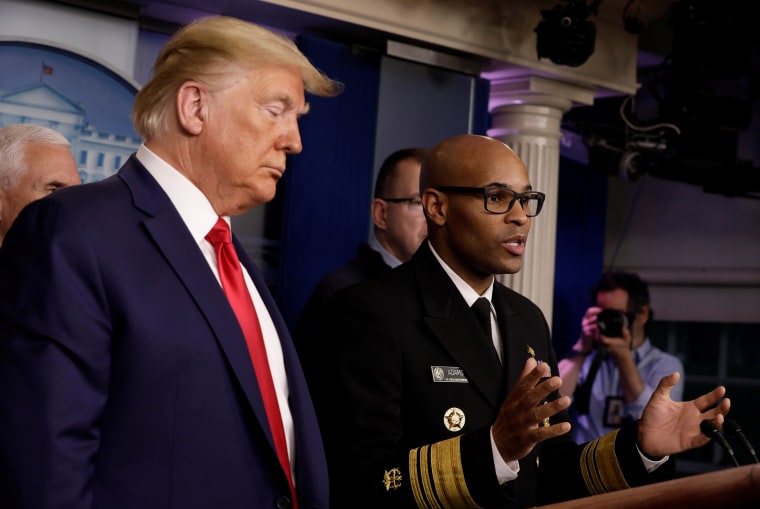Those of us who served in the intelligence community knew this day was coming. The day when President Donald Trump's near total disregard for intelligence professionals would eventually affect every American. Personally, I thought Trump's willful blindness might manifest itself in a failure to heed signs of an imminent terrorist strike, military assault or state-sponsored cyberattack. Instead, the missed warnings pointed to a pandemic that has so far resulted in over 82,000 infected Americans and over 1,100 dead here at home. While Trump claims the coronavirus was a "surprise," we've now learned that as early as January, intelligence professionals were sounding the alarm.
Our country’s intelligence agencies monitor global pandemic preparedness because the impact of such a virus poses a national security threat.
Our country's intelligence agencies monitor pandemic preparedness not only because of the possibility that adversaries could weaponize a virus, but also because the impact of such a virus poses a national security threat. A widespread, unchecked illness that affects troop strength, police and rescue staffing, health care workers, critical infrastructure and our economy makes us more vulnerable to both internal and external threats. That's why intelligence agencies assess global response capabilities generally and individual virus outbreaks specifically. Now it appears the president's disdain for unvarnished intelligence may have caused him to disregard their prescient warnings.
Whoever coined the phrase "ignorance is bliss" never met Trump. The president has a well-established record of ignoring his intelligence advisers on even the most serious issues. When Washington Post columnist Jamal Khashoggi was murdered inside the Saudi Consulate in Istanbul, our intelligence community concluded that Saudi government operatives, and more precisely the crown prince, were to blame. Trump disputed the findings. When U.S. intelligence agencies found the Russian government responsible for hacking into the Democratic National Committee and for social media propaganda during our 2016 presidential election, the president chose to accept Russian President Vladimir Putin's denial.
When the CIA, the State and Defense departments and other agencies all concluded that North Korea would not abandon its nuclear weapons program, Trump insisted he and Kim Jong Un could negotiate a deal. The president's repeated dismissals of articulable facts damaged and demoralized our key institutions and cast doubt upon honest brokers of the truth. Now the ripple effects of that damage are being felt far beyond the diplomatic community.
According to The Washington Post, "U.S. intelligence agencies were issuing ominous, classified warnings in January and February about the global danger of the coronavirus while President Trump and lawmakers played down the threat and failed to take action that might have slowed the spread of the pathogen." Almost a year before that, an annual threat report from the Office of the Director of National Intelligence by Dan Coats, then its director, stated, "The United States will remain vulnerable to the next flu pandemic or large-scale outbreak of a contagious disease that could lead to massive rates of death and disability, severely affect the world economy, strain international resources, and increase calls on the United States for support." Coats stepped down last year after he was reported to have angered the president with unwelcome intelligence assessments.
The 2020 report, which was supposed to have been released in February, remains mysteriously classified.
Until now, many Americans took a distant, impersonal view of the president's disdain for the truth presented in regular intelligence briefings and reports. Accounts of the president's lashing out at intelligence agency heads, briefers and analysts and his openly discounting even unanimous findings and conclusions may have been viewed as differences of opinion, self-serving posturing or, by some, the dismissal of "deep state" operatives.
And when it comes to how America should interact with North Korea or Saudi Arabia, there is a certain disconnect. Not everyone cares about the details of those decisions in large part because they do not touch the lives of everyday Americans. Debates between the White House and the intelligence community over foreign policy, geopolitical strategies and even adversarial threats sound to many Americans like standard Washington dissonance. Such disagreements were easier to pass off as mere differences of political opinion.
The pandemic is different, however, both because of how many people it has touched and because of the nonpartisan nature of the crisis. COVID-19 is — or at least should be — an apolitical problem with apolitical warnings and an apolitical response. Yet Trump's self-serving distrust of our intelligence agencies, and his harmful portrayal of them as partisan, caused him to blow off their reporting at our peril.
This time, the impact is personal, and the consequences are tangible. We need expert voices more than ever, and we need a president who will listen to them.
Related:


